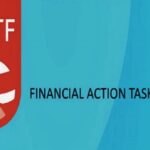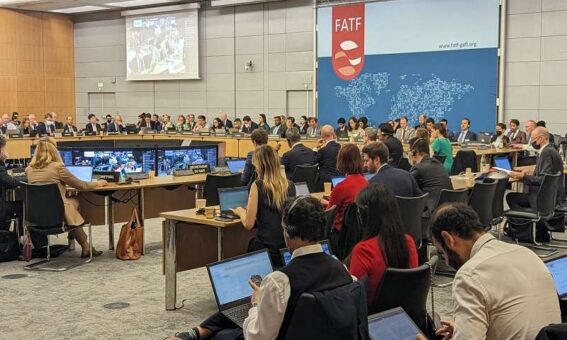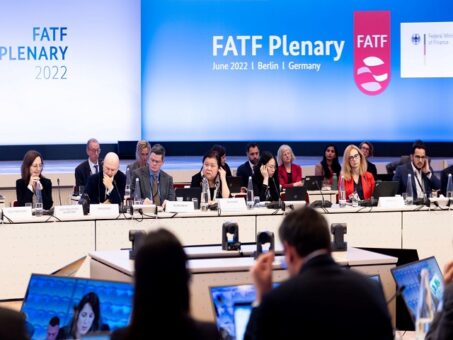Paris: The Financial Action Task Force (FATF), the preeminent global body overseeing anti-money laundering and countering the financing of terrorism (AML/CFT) efforts, concluded its fifth Plenary under the Singaporean presidency with significant strides in strengthening international frameworks.
(more…)Tag: FATF
-

FATF Advances Efforts to Combat Corruption and Minimize Impact on Non-Profits
PARIS, France: The Financial Action Task Force (FATF) concluded its third plenary under the Singaporean presidency, showcasing progress in combating corruption, proposing a revised non-profit standard for public consultation, and addressing challenges in implementing the FATF standard on virtual assets.
(more…) -

FBR’s efforts help Pakistan exit FATF grey list
ISLAMABAD: The Federal Board of Revenue (FBR) has said that its efforts in preventing tax crimes helped Pakistan to exit grey list of Financial Action Task Force (FATF).
Like many other governmental organizations, FBR has played a key role in completing the FATF action plans relating to DNFBPs, cash smuggling, investigating tax crimes for money laundering and confiscating the proceeds of tax frauds.
In 34 items of the FATF action plans, FBR has directly dealt with at least 8 actions and spearheaded the process of their implementation.
In order to ensure compliance with regard to DNFBPs, FBR has issued AML/CFT regulations, conducted extensive outreach programs to educate about DNFBPs, established a dedicated IT-based DNFBP Management System, launched customized mobile App for registrations and screening purposes, carried out a large number of onsite inspections and imposed a wide range of penalties for non-compliance.
READ MORE: FATF removes Pakistan from grey list
Similarly, in the area of cash smuggling, FBR Customs has fortified cross-border controls and implemented a comprehensive mechanism to combat cash smuggling by all means possible.
Likewise, FBR has also undertaken a large number of money laundering investigations against the tax crimes and made significant confiscations in this regard.
FBR also dedicated one of its senior officers, Mohammad Iqbal, who has made significant contributions to completing the FATF action plans while on deputation for 3 years in NACTA and later supervised the tasks related to DNFBPs.
Asim Ahmad, Chairman FBR/ Secretary Revenue Division, has felicitated all the government organizations and their key personnel including the concerned officers of Inland Revenue Service and Pakistan Customs who have worked tirelessly for the exit from the FATF grey list.
The Chairman FBR reiterated FBR’s unflinching resolve and an unwavering commitment to continue implementing the anti-money laundering and combating financing terror regime in the areas supervised by FBR.
-

FATF removes Pakistan from grey list
Financial Action Task Force (FATF) on Friday decided to remove Pakistan from grey list after the country made compliance with the conditions.
FATF is the world’s money laundering and terror-financing watchdog. It said that Pakistan has been removed from the grey list and is no longer subject to its increased monitoring process.
The Paris-based inter-governmental body had put Pakistan on its grey list of untrustworthy jurisdictions in June 2018 because of “strategic counter-terrorist financing-related deficiencies.”
Plenary meeting of the FATF ended and made decision regarding Pakistan.
Earlier, Analysts at Arif Habib Limited said: “We expect Pakistan to be taken off the grey list by the FATF amid the progress Pakistan has made so far against money laundering and terrorist financing (AML/CFT) in the past few years.”
To recall, Pakistan was placed on FATF’s Grey List in June 2018 whereby it was found non-compliant with recommendations of the FATF which targeted areas of risk assessment, national cooperation, targeted sanctions, preventative measures, due diligence, internal and third party controls, law enforcement, regulation and supervision for money laundering and terror financing, amongst others.
Skip forward to 2022, the FATF Plenary in June, under the German Presidency of Dr. Marcus Pleyer, acknowledged the progress Pakistan made against money laundering and terrorist financing (AML/CFT) with all 34 action points implemented.
Through various bills and amendments, the Pakistani authorities had diligently worked to satisfy the FATF. These related to laws against money laundering, freezing of assets and filing of cases against proscribed organizations, actions against terror financing etc.
However, final decision to take Pakistan off the grey list was conditional upon successful on-site visit of FATF. FATF team conducted on-site visit to Pakistan few weeks back, with a purpose of inspecting the legal, regulatory and operational reforms and procedures implemented for compliance.
The analysts said that following the exit from the list, Pakistan will still be required to work with the APG (its relevant regional bodies) in the regular course of the follow-up process to make further improvements in its AML & CFT framework, as and when required.
Having already suffered direct consequences and economic difficulties from its time on the grey list, the climactic graduation of Pakistan from the grey list will come no less than a breath of fresh air. It will be a major relief and accomplishment for Pakistan, and is expected to reap benefits in both, short and long run.
The immediate ramification of exiting grey list carries reputational implication for Pakistan, we believe. This positive development bodes well for Pakistan’s image which was recently further dented by the downgrading of rating by International Credit Rating agencies like Moodys.
With the international community—investors in particular, the removal from grey list is likely to strengthen Pakistan’s position especially with regards to the soundness of our financial systems and help regain their confidence.
Markets are expected to react positively to this news and overall sentiment is likely to remain upbeat for a while. Moreover, going forward, this should also help strengthen Pakistan’s case of re-rating and upgrading by the International Credit Rating agencies.
In addition, one of the structural benchmarks laid down by the IMF for Pakistan stated ‘Adoption of measures to strengthen the effectiveness of the AML/CFT framework to support the country’s efforts to exit the Financial Action Task Force (FATF) list of jurisdictions with serious deficiencies.’ This means, Pakistan complies with one more structural benchmark of the IMF, paving way for successful ninth review which is due in November 2022 enabling disbursement of SDR 894 million from the Fund.
-

Pakistan set to exit FATF grey list
Plenary meeting of the FATF ends on Friday and a decision regarding Pakistan, whether to remove from grey list or not, is expected to be announced.
“We expect Pakistan to be taken off the grey list by the FATF amid the progress Pakistan has made so far against money laundering and terrorist financing (AML/CFT) in the past few years,” said analysts at Arif Habib Limited.
To recall, Pakistan was placed on FATF’s Grey List in June 2018 whereby it was found non-compliant with recommendations of the FATF which targeted areas of risk assessment, national cooperation, targeted sanctions, preventative measures, due diligence, internal and third party controls, law enforcement, regulation and supervision for money laundering and terror financing, amongst others.
Skip forward to 2022, the FATF Plenary in June, under the German Presidency of Dr. Marcus Pleyer, acknowledged the progress Pakistan made against money laundering and terrorist financing (AML/CFT) with all 34 action points implemented.
Through various bills and amendments, the Pakistani authorities had diligently worked to satisfy the FATF. These related to laws against money laundering, freezing of assets and filing of cases against proscribed organizations, actions against terror financing etc.
However, final decision to take Pakistan off the grey list was conditional upon successful on-site visit of FATF. FATF team conducted on-site visit to Pakistan few weeks back, with a purpose of inspecting the legal, regulatory and operational reforms and procedures implemented for compliance.
The analysts said that following the exit from the list, Pakistan will still be required to work with the APG (its relevant regional bodies) in the regular course of the follow-up process to make further improvements in its AML & CFT framework, as and when required.
Having already suffered direct consequences and economic difficulties from its time on the grey list, the climactic graduation of Pakistan from the grey list will come no less than a breath of fresh air. It will be a major relief and accomplishment for Pakistan, and is expected to reap benefits in both, short and long run.
The immediate ramification of exiting grey list carries reputational implication for Pakistan, we believe. This positive development bodes well for Pakistan’s image which was recently further dented by the downgrading of rating by International Credit Rating agencies like Moodys.
With the international community—investors in particular, the removal from grey list is likely to strengthen Pakistan’s position especially with regards to the soundness of our financial systems and help regain their confidence.
Markets are expected to react positively to this news and overall sentiment is likely to remain upbeat for a while. Moreover, going forward, this should also help strengthen Pakistan’s case of re-rating and upgrading by the International Credit Rating agencies.
In addition, one of the structural benchmarks laid down by the IMF for Pakistan stated ‘Adoption of measures to strengthen the effectiveness of the AML/CFT framework to support the country’s efforts to exit the Financial Action Task Force (FATF) list of jurisdictions with serious deficiencies.’ This means, Pakistan complies with one more structural benchmark of the IMF, paving way for successful ninth review which is due in November 2022 enabling disbursement of SDR 894 million from the Fund.
-

Pakistan to stay on FATF grey list till onsite visit
BERLIN: Pakistan will stay on the grey list despite making compliance to all the action plans set by the Financial Action Task Force (FATF). An onsite visit to Pakistan is required to verify the implementation of the country, a statement issued on Friday by the watchdog said.
However, Pakistan has not been officially removed from the FATF’s grey list.
READ MORE: FATF retains Pakistan in grey list; admits progress
The watchdog said that FATF will “monitor the COVID-19 situation and conduct an on-site visit at the earliest possible date”.
The FATF officials will hold a press briefing shortly on the outcomes of the four-day plenary session of the watchdog that reviewed Pakistan’s action plans.
READ MORE: Pakistan urges FATF to take action against Indian plot
A government official had earlier said in a conversation with the BBC that matters will take seven to eight months to settle even after Pakistan has made its way out of the watch list as the FATF team will visit Pakistan for an inspection.
READ MORE: Pakistan likely to exit from FATF’s grey list
Pakistan had launched a massive diplomatic effort to get off the FATF grey list. Minister of State for Foreign Affairs Hina Rabbani Khar, who is also the chair of Pakistan’s National FATF Coordination Committee, is leading the Pakistan delegation at the plenary meeting that started on June 14, 2022.
-

FBR vows to curb money laundering in real estate
ISLAMABAD: The Federal Board of Revenue (FBR) has vowed to continue its efforts to stop money laundering through real estate and precious metals and stones, including gold and jewellery.
FBR Chairman Dr. Muhammad Ashfaq Ahmed that FBR will continue implementing the AML/CFT regulations in order to curb the menace of money laundering through real estate and precious metals and stones, including gold and jewellery.
The chairman issued the statement on the major achievement of completing actions on Designated Non-Financial Businesses and Professions (DNFBS) in the FATF action plan I just one reporting cycle and one year ahead of the deadline in September 2022.
The Chairman FBR Dr. Muhammad Ashfaq Ahmed congratulated DG DNFBPs, Mr. Mohammad Iqbal, and his team for the tireless efforts to complete the actions on DNFBPs in a short span of three months and one year ahead of the deadlines.
The FATF plenary in its public statement has noted that Pakistan has now satisfied the requirements of most of its action items under the 2021 action plan, ahead of deadlines and in its first reporting cycle.
In June 2021, the FATF plenary had approved a seven actions new action plan for Pakistan, focusing on combating money laundering. This action plan contained two actions specific to DNFBPs, in particular, the real estate agents and Dealers in Precious Metals and Stones (DMPS). FBR was already designated as AML/CFT regulatory authority for real estate agents, DPMS and accountants other than those registered with ICAP and ICMAP under the Anti-Money Laundering Act, 2010, through amendments made in September 2020.
Since the designation of FBR as the AML/CFT regulatory authority, FBR issued AML/CFT regulations for its regulated entities and also embarked upon an extensive outreach to educate and facilitate the DNFBPs on implementation of the new AML/CFT regime. A dedicated portal was made available on FBR website, which contains comprehensive guidance documents and other information for the DNFBPs. FBR also launched a customized mobile App for the registration by DNFBPs, screening the lists of proscribed /designated persons and generating Suspicious Transaction Reports (SRTs). A detailed supervisory plan was chalked out for offsite and onsite supervision of the DNFBPs.
Since June 2021, FBR has carried out onsite inspections of a large number of DNFBPs and imposed a wide range of penalties on the delinquent entities. The real estate associations were also taken on board for the implementation of the AML/CFT obligations.
-

FATF retains Pakistan in grey list; admits progress
The Financial Action Task Force (FATF) on Thursday kept Pakistan in the grey list or increased monitoring list with an acknowledgment of completing almost all the action plans.
Pakistan has been on the grey list for deficiencies in its counter-terror financing and anti-money laundering regimes since June 2018.
Announcing the decision, FATF President Dr Marcus Pleyer said that Pakistan had to complete two concurrent action plans with a total of 34 items. “It has now addressed or largely addressed 30 of the items,” he said.
“Its most recent action plan from June this year, which largely focused on money laundering deficiencies, was issued after the FATF’s regional partner — the Asia Pacific Group — identified a number of serious issues.
“Overall, Pakistan is making good progress on this new action plan. Four out of the seven items are now addressed or largely addressed.”
He said that this included showing that financial supervisors are conducting on-site and off-site checking on non-financial sector businesses and enacting legislative amendments to improve international cooperation.
Commenting on the action plan devised in 2018 which focused on terror financing, the FATF president said that Pakistan was still assessed to have largely addressed 26 out of 27 items.
“Pakistan has taken a number of important steps but needs to further demonstrate that investigations and prosecutions are being pursued against the senior leadership of UN designated terror groups,” he said.
All these changes are about helping authorities stop corruption, preventing terrorism and organized criminals from benefitting from their crimes, he said, thanking the government for their “continued strong commitment” to the process.
Responding to a question about whether Pakistan would be blacklisted for its failure to act against those on the UN terrorism list, Dr Pleyer said that the country had completed 30 items out of 34 on two action plans.
“This shows the clear commitment of the Pakistani government so there is no discussion on blacklisting Pakistan and the FATF urges the country to address the remaining four items,” he said, adding that the government was cooperating with the financial watchdog.
Pakistan will remain on enhanced follow-up, and will continue to report back to the APG on progress to strengthen its implementation of AML/CFT measures. Pakistan’s fourth progress report is due 1 February 2022.
-

FBR apprises realtors about FATF requirements
ISLAMABAD: Dr. Muhammad Ashfaq Ahmed, chairman of the Federal Board of Revenue (FBR) has apprised the real estate agents about the requirement of the Financial Action Task Force (FATF).
(more…) -

Pakistan urges FATF to take action against Indian plot
ISLAMABAD – Pakistan has formally requested the Financial Action Task Force (FATF) to take immediate action against what it alleges to be India’s concerted efforts to politicize the international watchdog and influence decisions to place Pakistan on the grey list.
(more…)